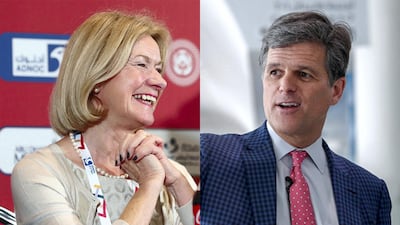If you are born into injustice, rejected by society, held down, ignored — how do you escape?
First, you stand. You walk. And then you run. You find others to run with you, and the run becomes a race. In time, and with determination, the race becomes a movement.
For Special Olympics, our movement began 50 years ago, in 1968, in a nearly empty stadium in the city of Chicago. It was a time when people with intellectual disabilities were systematically erased from society. The idea of including them in a sporting event, in public, where they could challenge themselves and one another, was seen by some as strange, even a little disturbing. But to those who participated, it was joyful and liberating. And to a few who understand what it meant, it was a true game-changer.
How small we were then! And how much has changed on the journey that brings us this week to the United Arab Emirates, to Abu Dhabi, to the largest Special Olympics World Games in the history of World Games, and the first in the Middle East. The celebration of our 50th year finds Special Olympics practically everywhere — more than 190 nations are participating in World Games — with more than six million athletes, 80 per cent of them living outside the United States.
Special Olympics was begun by a woman, Eunice Kennedy Shriver, who was determined not to let obstacles of every variety, hinder the movement towards dignity and equality. We grew through the determination of untold millions of athletes — girls and boys, women and men — who claimed dignity and equality for themselves. They did this by training, practicing and competing. Their life-changing act was not to fight, but to run, swim, skate, kick, lift, throw, jump and tumble — always with courage, and to the best of their ability.
In Abu Dhabi this week and next, more than 7,500 athletes will compete, brave women and men. We will all see where determination has taken them.
We will see Chaica Al Qassimi, an Emirati and student of martial arts who is a torchbearer and judo referee at these games.
We will see Mariam Adel Azzab, who joined Special Olympics Egypt in 2001, when she was 15, and has competed in athletics, table tennis and equestrian events. She’s also an entrepreneur, owning her own cake business.
We will see Siddiq, who has competed in bowling, hockey and swimming, and who will represent Saudi Arabia in women’s basketball.
We will see Daimi Aza, of Puerto Rico, a rhythmic gymnast who trained in the aftermath of a devastating hurricane that struck her home island.
And we will see and hear from Loretta Claiborne, of the United States, who will be the keynote speaker at a majlis at which she will tell her story of overcoming severe physical disabilities and discrimination through the power of running. Besides being our Chief Inspiration Officer and member of the International Board of Directors, Loretta is a veteran marathon runner and martial-arts expert and has been an inspirational leader to countless younger athletes.
World Games stories like these are stories of success. The joy that will be generated here in the UAE is a mark of progress. But the paradox of progress is that each step forward reveals just how much farther we must go. Exclusion is still real for millions of people with intellectual disabilities around the world, in every aspect of their lives — not only in sports, but also in education, health and the workplace.
That is why we are celebrating our 50th anniversary by challenging people across the globe to join an all-out effort to end discrimination against people with intellectual disabilities. We know that our 50-year race, our 50-year movement, is in some ways only a beginning.
Our athletes are determined to lead us there. Ask them how, and this is what they will say:
Our goal is a world where inclusion is the rule, not the exception. Where all sports are unified sports. Where all schools are unified schools, and all health is inclusive health. Where the arts as much as the workplace is inclusive. A world where intellectual disabilities, gender, race, colour and faith are incidental markers that do not obscure the humanity we all share.
If you fail to understand or accept inclusion, we will include you anyway, and insist that you include us. If you show us hatred with words of cruelty and ridicule, we will give you better words, like Respect. Instead of "persons with disabilities," we will share a new term, now used in the UAE: "people of determination."
If equality will not go to us, we will go towards equality. Come with us. We will race you there.









